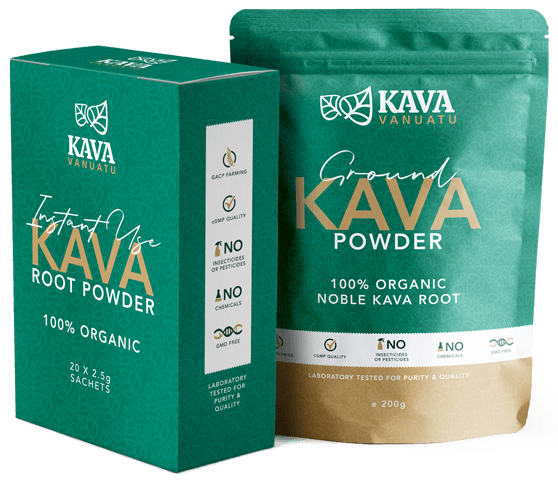100% OrganicKavaRoot Powder
All of Kava Vanuatu’s kava products are made from pure 100% organic Noble kava plants, specially processed to retain freshness – Try our premium kava Australia and taste the Kava Vanuatu difference!
OUR NOBLE KAVA
IS GROWN INVanuatu
Premium Vanuatu KavaTaste the Difference
SETTING THE STANDARD IN PREMIUM QUALITY KAVA
We pride ourselves on producing the finest kava powder available. Importantly, our kava is specially processed immediately after harvest to retain freshness and quality.
Kava Vanuatu’s 100% organic kava products are processed to the highest quality standard using our state-of-the-art processing facilities.
Our Noble kava variety is both single origin and single cultivar, which means we can ensure a consistently high quality, premium product, direct from our farms to you.
Our plants are organically grown on small traditional farms located on the remote islands of Vanuatu. The local environment is free of any kind of water, soil, or air-borne pollutants. These plants are cultivated in nutrient rich volcanic soil on which neither pesticides, insecticides nor fertilizers have ever been used.
We cultivate and harvest our plants using methods that respect and support the conservation of the environment.
All our kava products undergo strict quality control and testing to ensure consistently superior quality kava.
We hope you enjoy our kava products as much as we take pride in producing them for you!
PACKAGED AND LABORATORY TESTED IN AUSTRALIA
KavaUses
As the traditional beverage of Vanuatu, Kava is not merely enjoyed socially or used for cultural reasons. In Vanuatu, it is also used as a medicinal plant which is purported to possess extraordinary properties.
KavaFAQ
What is Kava?
Kava is a term used interchangeably for the kava plant, kava drink or kava beverage. Other names used to refer to kava include: kava kava; kawa; ava; awa; yati; yagona; and yangona.
What is a Kava Plant?
Native to Micronesia, Melanesia, and Polynesia, the kava plant (Piper methysticum G. Forst.) is a robust perennial shrub belonging to the Black pepper family Piperaceae. It has distinctive heart shaped, pointed, smooth green leaves about 15 cm in length. The root becomes approximately 5 to 8 cm thick at maturity at about 60 cm above the ground. The plant reaches maturity for cultivation around 3-5 years after planting.
What is a kava drink?
A traditional kava drink or kava beverage uses fresh roots & rhizomes from the kava plant, ground until it is fine and fibrous, soaked in water and then strained. The kava is then drunk from a cup, sometimes a coconut shell. In Vanuatu kava drinks are often prepared in this manner.
Alternatively, another way of preparing a traditional kava drink / beverage is to use dried roots & rhizomes from the kava plant, ground finely, wrapped in cloth, infused in water, and then strained. In Fiji, it is more common for kava drinks to be prepared in this way.
How long have people been consuming kava drinks?
The kava beverage has significant cultural importance for communities throughout Micronesia, Melanesia and Polynesia and is well known to have been consumed in countries like Vanuatu and Fiji for more than 1000 years. Kava is an integral part of the dynamic and evolving cultural practices of many Pacific peoples and is often regarded as an icon of national and cultural identity. It also commonly forms an integral part of various kava drinking ceremonies. In recent times, kava has been consumed as a recreational beverage in both the Pacific community as well as the wider international community.
What type of kava is used to make a kava drink?
A number of different types of kava varieties referred to as “Noble” kavas are used to make kava drinks. Noble kava, also known as drinking kava, varieties have been used by Pacific communities for kava beverage production for many centuries. These varieties are distinguished by their geographical distribution, physical characteristics, and the properties of the kava beverage they produce.
Are all kava varieties suitable for making kava drinks?
There are well over 100 different varieties of kava plant. The Vanuatu Kava Act No.7 (2002), for example, categorises Kava types under the following categories: “Noble” kava, “Medicinal” kava, “Two Day” kava, and Wichmannii kava. The kava varieties which are not classified as a Noble Kava are not particularly suitable for regular kava drinking.
What is the effect of consuming a kava drink?
A kava drink traditionally prepared from a Noble kava variety is consumed for a sense of relaxation and tranquillity. The pharmacologically active compounds in kava are kavalactones. Kavalactones have been reported to have psychopharmacological effects as well as muscle relaxant, local anaesthetic, anxiolytic, and anticonvulsive properties. Moderate to high doses of kavalactones can lead to drowsiness and sedation.
Can I hallucinate if I have a kava drink?
Kavalactones are pharmacologically active compounds naturally present in the kava plant. Despite having psychoactive properties, they are not considered hallucinogenic.
Can I have a kava drink if I am pregnant?
Insufficient information is available to allow an assessment of the safety of kava beverage consumption in pregnant or lactating women. Therefore, it is not possible to draw a conclusion on the safety of kava beverage consumption for this population subgroup. A Kava drink should not be consumed by pregnant or lactating women.
Can I give my child a kava drink?
Insufficient information is available to allow an assessment of the safety of kava beverage consumption in adolescents or children. Therefore, it is not possible to draw a conclusion on the safety of kava beverage consumption in this population subgroup. A Kava drink should not be consumed by children.
Can I consume kava drinks regularly?
Yes. The moderate use of traditionally prepared Noble kava drinks has not been associated with specific health problems.
When should I consume my kava drink after preparation?
Any kava beverage should be consumed shortly after preparation to avoid spoilage.
Can I make a kava tea drink using hot water?
Boiling (and straining) kava root can result in a potent beverage, but it also creates an almost unbearable taste and consistency.
Can I drive after having a kava drink?
Depending upon the quantity of kava consumed, an individual’s body weight and their metabolism, the consumption of a kava drink can affect motor function and may impair the ability to operate machinery, or safely operate a motor vehicle.
Can you have a kava drink with coffee?
The mixture of a kava drink and coffee (caffeine) can cause an increase in the stimulation effects of caffeine when the two are consumed within a reasonable time together.
Can I mix a kava drink with alcohol?
Kava should not be consumed with alcohol.
What is the potential for other drug interactions?
Limited information is available on the potential for drug interactions. However, caution is recommended when consuming kava beverages in combination with other medicines or other herbal preparations. It is best to seek individual advice from a licenced medical practitioner.
Can a kava drink cause hepatotoxicity?
Pacific cultures that regularly consume kava drinks from traditionally prepared Noble kava plant varieties have a history of safe use without producing endemic hepatotoxicity illnesses.
So, how safe is it to drink Kava?
Kava has a long history of consumption in the South Pacific and plays an integral role in maintaining the cultural continuity and identity of many Pacific peoples. This significant history of use demonstrates that it is possible to safely consume kava drinks in moderation when prepared and consumed in line with historically safe traditional practices.






